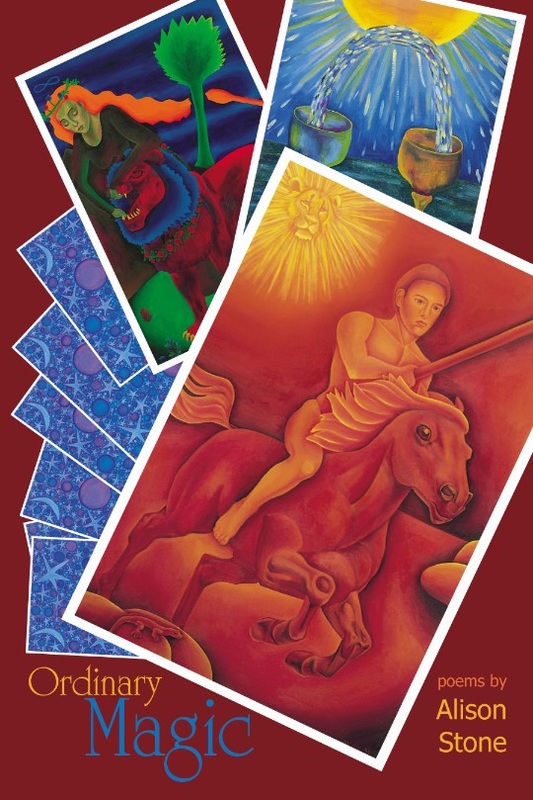|
Review by Greg Bem (@gregbem)
Ordinary Magic by Alison Stone (Released by NYQ Books, 2016) If light were music, mine would be the tune your mother crooned as you, the day's bumps and abandonments erased, sank milk-drunk into sleep. from "The Major Arcana XVII: The Star" (32) Alison Stone's 78-poem book exploring the symbolic, historical, and practical-contemporary applications of the tarot is a book that is full of surprises, but carries the burden of countless contexts demanding further exploration. Though aware of the tarot (complete with its "Major Arcana" featuring the images that tarot stereotypes are derived from: The Fool, The Hermit, Judgment, and so on, and the Minor Arcana with its wands, swords, cups, and pentacles) I must profess I'm no expert in it. Fortunately, Ordinary Magic carries a title that describes what might be found in such rich material: magic (or heightened experience, at least) in the day to day. This presence of accessibility allows this book to shine, and Stone's voice to carry from poem to poem. Many of the poems in this book latch on and, through narrative twists and lyric invention, pull close and let loose the reader's attention. The effect is splendid, allowing a shuffling of poems to allow ebbs and flows of tension, moments of the most curious splendor, and the grit of a touching and raw humanism. There is an ecompassing quality to these poems as a collection, framed under a tarot which balances fate and an urgency, a compelling cause to reflect and act, that flips pages and causes sudden eruptions of emotion. By seed and root, by bud and stem... You echo, our voices weaving, high and low tones in contrast, the way your dark skin shines against my paleness when we make love. from "Cups 10: Tenth Anniversary" (82) I think of what brings the concept of intimacy into an application of our lives and how we bring the private forward into a space of honesty, openness, and the aformentioned accessibility. Like pulling from the deck, like drawing the cards as those erasing the line in the sand, that line of division. With these poems, Stone has contributed significant parts of her life. Experiences. Moments. Revelations. Reflections. And in most cases the poems as poems alone work with staggering significance. They are intimate and there is no doubt that they are of vital importance for defining Stone's life, or the lives of characters she has chosen to describe, be they historical or contemporary. A healthy blend of additional frames beneath the tarot gives the tarot its greatest lengths and avoids the pitfall of cliches one would expect to come out of "tarot writing." These frames include allegorical tales reimagined in new tones and persepectives. These frames include utterances of commentary upon those who are no longer part of the moment that crafts a personal memory or anecdote. Foreign and diffused, your lyre notes drift down. Sing to someone else! I am not your flower; I am pollen brought to flight with every breeze. You would bind me in a dying skin. You take my hand and call me by my secret name. from "Swords 4: Eurydice to Orpheus" (70) The thick spectrum of poetic storytelling making up this book has, like all recanting, high moments and low moments. Stone's highest are when she plays with language and explores her voice's fullest potential, and when such breaking of limitations allows an emergence of new language. Her lowest? When the poems become narratives, distancing themselves from the aural and visual qualities that make this book shine. Though these pieces of prose disguised as verse may reflect a juxtaposition of sorts, I found the effect weakening of the book as a whole: why not write in blocks of prose, if that is the visual and auditory effect that will result from reading the poem? There are many questions regarding the reasoning behind this book, questions that I wish were answered more directly. Stone has provided us with a gift of satisfying and challenging poems, but beyond the tarot, what do they stand for and where did they come from? And as such, what is the tarot operating as here? The frame of the book, and the general theme of the book, never seems enough, especially considering the revelatory nature of the tarot itself. But to ask the readers to understand the many nuances, the countless cultural and literary and historical references packed into this book's pages is a stifling request indeed. [. . .] A thick snake slithers and coils. Which scares you more, to believe that life is unfair or to believe that life is fair? from "The Major Arcana XI: Justice" (26) Urgencies for description aside, the book is truly enjoyable and creates moment after moment for pondering life through Stone's eyes. Rough on the edges, this book follows in a long line of the author's books, and is certainly not to be her last. How it (and the many capacities of the tarot) fit into Stone's grander, more enduring vision is exciting to think about, and I will be excited to see these developments, connections, and (hopefully) the further emergence of necessary contexts in the coming years.
1 Comment
6/11/2017 03:09:43 am
In a love Tarot reading, the Chariot Tarot card is a symbol of energy, action, courage and success. The Chariot card is a symbol of our intentions, and if it is love you seek, the Chariot often signifies the onset of new romantic experiences or relationships.
Reply
Your comment will be posted after it is approved.
Leave a Reply. |
Welcome to Yellow Rabbits. Thanks for visiting.
All reviews by Greg Bem unless marked otherwise.
SearchYellow Rabbits Reviews
Archives by Month
August 2019
|

